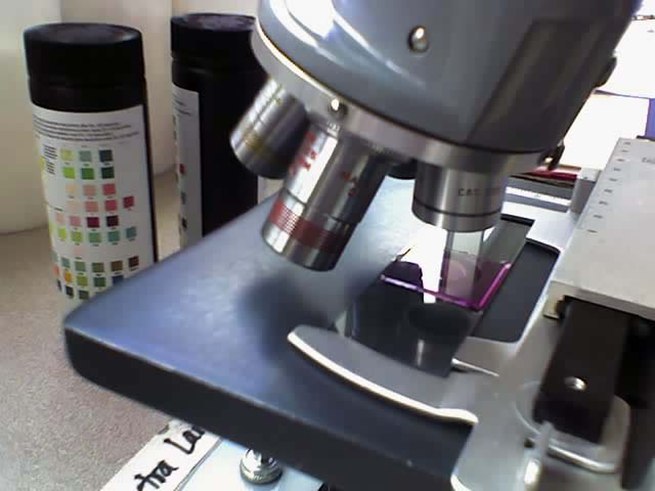Main Difference
The main difference between Histology and Pathology is that the Histology is a study of the microscopic anatomy of cells and tissues of plants and animals and Pathology is a study and diagnosis of disease.
-
Histology
Histology is the study of the microscopic anatomy (microanatomy) of cells and tissues of plants and animals. It is commonly performed by examining cells and tissues under a light microscope or electron microscope, the specimen having been sectioned (cut into a thin cross section with a microtome), stained, and mounted on a microscope slide. Histological studies may be conducted using tissue culture, where live human or animal cells are isolated and maintained in an artificial environment for various research projects. The ability to visualize or differentially identify microscopic structures is frequently enhanced through the use of histological stains. Histology is an essential tool of biology and medicine.
Histopathology, the microscopic study of diseased tissue, is an important tool in anatomical pathology, since accurate diagnosis of cancer and other diseases usually requires histopathological examination of samples. Trained physicians, frequently licensed pathologists, are the personnel who perform histopathological examination and provide diagnostic information based on their observations. The trained personnel who prepare histological specimens for examination are histotechnicians, histotechnologists, histology technicians (HT), histology technologists (HTL), medical scientists, medical laboratory technicians, or biomedical scientists and Biomedical Science Support Workers. Their field of study is called histotechnology.
-
Pathology
Pathology (from the Greek roots of pathos (πάθος), meaning “experience” or “suffering” whence the English word “path” is derived by transliteration, and -logia (-λογία), “study of”) is a significant component of the causal study of pathogens and a major field in modern medicine and diagnosis. Hence, ‘the study of paths’, by which disease comes.
The term pathology itself may be used broadly to refer to the study of disease in general, incorporating a wide range of bioscience research fields and medical practices (including plant pathology and veterinary pathology), or more narrowly to describe work within the contemporary medical field of “general pathology,” which includes a number of distinct but inter-related medical specialties that diagnose disease—mostly through analysis of tissue, cell, and body fluid samples. Used as a count noun, “a pathology” (plural, “pathologies”) can also refer to the predicted or actual progression of particular diseases (as in the statement “the many different forms of cancer have diverse pathologies”), and the affix path is sometimes used to indicate a state of disease in cases of both physical ailment (as in cardiomyopathy) and psychological conditions (such as psychopathy). Similarly, a pathological condition is one caused by disease, rather than occurring physiologically. A physician practicing pathology is called a pathologist.
As a field of general inquiry and research, pathology addresses four components of disease: cause, mechanisms of development (pathogenesis), structural alterations of cells (morphologic changes), and the consequences of changes (clinical manifestations). In common medical practice, general pathology is mostly concerned with analyzing known clinical abnormalities that are markers or precursors for both infectious and non-infectious disease and is conducted by experts in one of two major specialties, anatomical pathology and clinical pathology. Further divisions in specialty exist on the basis of the involved sample types (comparing, for example, cytopathology, hematopathology, and histopathology), organs (as in renal pathology), and physiological systems (oral pathology), as well as on the basis of the focus of the examination (as with forensic pathology).
The sense of the word pathology as a synonym of disease or pathosis is very common in health care. The persistence of this usage despite attempted proscription is discussed elsewhere.
-
Histology (noun)
The study of the microscopic structure, chemical composition and function of the tissue or tissue systems of plants and animals.
-
Pathology (noun)
The branch of medicine concerned with the study of the nature of disease and its causes, processes, development, and consequences.
-
Pathology (noun)
The medical specialty that provides microscopy and other laboratory services (e.g., cytology, histology) to clinicians.
“The surgeon sent a specimen of the cyst to the pathology department for staining and analysis to determine its histologic subtype.”
-
Pathology (noun)
Pathosis: any deviation from a healthy or normal structure or function; abnormality; illness or malformation.
“abnormality|disease|illness|pathosis”
-
Histology (noun)
the study of the microscopic structure of tissues.
-
Pathology (noun)
the science of the causes and effects of diseases, especially the branch of medicine that deals with the laboratory examination of samples of body tissue for diagnostic or forensic purposes
“research people skilled in experimental pathology”
-
Pathology (noun)
pathological features considered collectively; the typical behaviour of a disease
“the pathology of Huntington’s disease”
-
Pathology (noun)
a pathological condition
“the dominant pathology is multiple sclerosis”
-
Pathology (noun)
mental, social, or linguistic abnormality or malfunction
“the city’s inability to cope with the pathology of a burgeoning underclass”

